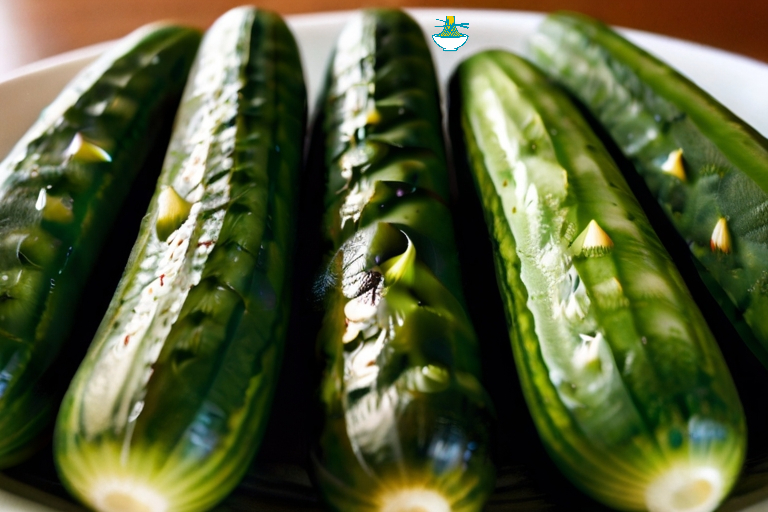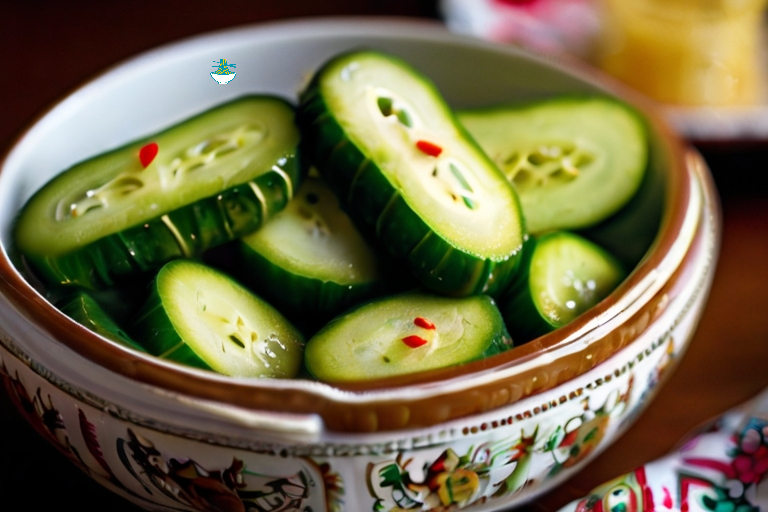Dive into the culinary heritage of Estonia with Hapukurk, a traditional dish that embodies the essence of Baltic flavors. Hapukurk, meaning "sour cucumber" in Estonian, is a refreshing and tangy delicacy that reflects the country's rich culinary traditions. Made from cucumbers marinated in a brine of vinegar, water, salt, and dill, Hapukurk offers a delightful blend of sourness and freshness, perfect for both appetizers and accompaniments to main courses. This iconic dish not only tantalizes the taste buds but also provides a glimpse into Estonia's cultural heritage and its connection to the land and sea. Experience the vibrant flavors of Estonia with Hapukurk, a beloved culinary treasure cherished by locals and visitors alike.
Here's a traditional recipe for Hapukurk, Estonian pickled cucumbers:
Ingredients:
- 6-8 small to medium-sized cucumbers (Kirby or pickling cucumbers work best)
- 2 cups water
- 1 cup white vinegar
- 2 tablespoons salt
- 2 tablespoons sugar
- 2 cloves garlic, peeled and smashed
- 1 teaspoon whole black peppercorns
- 1 teaspoon mustard seeds
- 1 teaspoon dill seeds (or a few sprigs of fresh dill)
- 1 bay leaf

Instructions:
1- Wash the cucumbers thoroughly and slice off the ends. If desired, you can leave them whole or slice them into spears or rounds.
2- In a saucepan, combine water, vinegar, salt, sugar, garlic, black peppercorns, mustard seeds, dill seeds, and bay leaf. Bring the mixture to a boil, then reduce the heat and let it simmer for about 5 minutes. Remove from heat and let the brine cool to room temperature.
3- Place the cucumbers in a clean glass jar or airtight container. Make sure they fit snugly but aren't too tightly packed.
4- Once the brine has cooled, pour it over the cucumbers, ensuring they are completely submerged. If needed, you can weigh them down with a small plate or a clean stone to keep them submerged.
5- Seal the jar or container tightly and store it in the refrigerator.
6- Let the cucumbers pickle for at least 24 hours before serving to allow the flavors to develop. They will keep well in the refrigerator for several weeks.
7- Serve the Hapukurk as a side dish alongside traditional Estonian meals or as a tasty snack on its own.
Enjoy your homemade Hapukurk, and savor the tangy goodness of Estonian pickled cucumbers!
Nutritional Values:
Here are the approximate nutritional values for the ingredients used in the Hapukurk recipe:
Cucumbers (6-8 small to medium-sized cucumbers):
- Calories: 45-60 kcal
- Carbohydrates: 10-15 g
- Fiber: 2-3 g
- Protein: 2-3 g
- Fat: 0-1 g
- Vitamin K: 20-30% of the Daily Value (DV)
- Vitamin C: 10-20% DV
- Potassium: 200-300 mg
- Other vitamins and minerals in smaller amounts
benefits:Cucumbers are low in calories and a good source of hydration due to their high water content. They also provide essential vitamins and minerals, including vitamin K for bone health, vitamin C for immune support, and potassium for heart health.
White vinegar (1 cup):
- Calories: 0 kcal
- Carbohydrates: 0 g
- Fat: 0 g
- Protein: 0 g
benefits:White vinegar is calorie-free and adds flavor to dishes without extra fat or sugar. It may also have some health benefits, such as aiding digestion and helping to control blood sugar levels.
Salt (2 tablespoons):
- Calories: 0 kcal
- Sodium: Approximately 4,600 mg (varies based on type of salt used)
benefits:Salt is essential for regulating fluid balance, nerve function, and muscle contractions in the body. However, excessive salt intake can lead to high blood pressure and other health problems, so it's important to consume it in moderation.
Sugar (2 tablespoons):
- Calories: 30 kcal
- Carbohydrates: 8 g
- Fat: 0 g
- Protein: 0 g
benefits:Sugar provides quick energy but should be consumed in moderation due to its high calorie content and potential negative effects on health, such as weight gain and increased risk of chronic diseases like diabetes and heart disease.
Garlic (2 cloves):
- Calories: 10 kcal
- Carbohydrates: 2 g
- Fiber: 0.1 g
- Protein: 0.5 g
- Vitamin C: 3 mg
- Other vitamins and minerals in smaller amounts
benefits:Garlic is rich in antioxidants and compounds that may help reduce inflammation and lower cholesterol levels. It also has antimicrobial properties and may support immune function.
Black peppercorns (1 teaspoon):
- Calories: 5 kcal
- Carbohydrates: 1 g
- Fiber: 0.5 g
- Protein: 0.2 g
benefits:Black peppercorns contain piperine, a compound that may enhance digestion, improve nutrient absorption, and have antioxidant properties. They also add flavor to dishes.
Mustard seeds (1 teaspoon):
- Calories: 5 kcal
- Carbohydrates: 0.5 g
- Fiber: 0.5 g
- Protein: 0.5 g
benefits:Mustard seeds are a good source of antioxidants, vitamins, and minerals. They may help improve digestion, reduce inflammation, and protect against certain chronic diseases.
Dill seeds (1 teaspoon):
- Calories: 5 kcal
- Carbohydrates: 1 g
- Fiber: 1 g
- Protein: 0.5 g
benefits:Dill seeds contain antioxidants and essential oils that may have antimicrobial and anti-inflammatory properties. They are also rich in vitamins and minerals, including calcium and iron.
Please note that these values are approximate and can vary based on factors such as the specific type and size of ingredients used, as well as preparation methods. Additionally, the nutritional values provided are for the ingredients themselves and do not account for any variations in serving size or additional ingredients that may be included in the final dish.


Comments